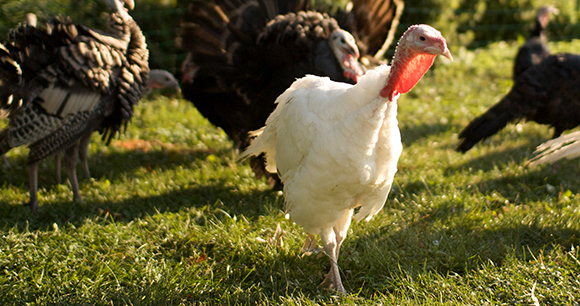
Washington, DC—American consumers are increasingly concerned about how animals raised for food are treated. But those wishing to purchase a higher-welfare turkey for Thanksgiving this year will be bombarded with a number of misleading turkey labels sanctioned by the US Department of Agriculture, the Animal Welfare Institute (AWI) has found.
Each Thanksgiving, 85 to 90 percent of people nationwide collectively consume an estimated 46 million turkeys, according to the National Turkey Federation. The vast majority of birds found on supermarket shelves were raised in overcrowded, disease-ridden factory farms without access to fresh air.
Turkeys in such industrial systems breathe in dangerous levels of ammonia and suffer from health and welfare problems resulting from selective breeding for rapid growth and high meat yield. They are forced to endure painful mutilations to prevent feather pecking, cannibalism, and other aggressive behaviors due to crowding and stress.
Consumers seeking alternatives to conventionally raised turkeys have more options than ever before. But they can be tricked into paying a premium for products with vague, subjective animal-raising claims, such as “ethically raised” or “thoughtfully raised,” for which there are no regulatory standards or third-party certification programs. Worse still, the USDA is aware of these confusing labels, yet continues to allow producers to mislead the public by making animal welfare and environmental claims without sufficient supporting evidence.
“Government regulators behave as though animal welfare were a subjective concept that can be defined by individual producers as they see fit,” said Dena Jones, director of AWI’s farm animal program. “In reality, animal welfare is a scientific concept that must be properly substantiated in order for consumers to be confident that these products truly meet a higher standard.”
The inhumane treatment of turkeys continues upon leaving the farm. During transport and before reaching the slaughter line, thousands of birds suffer from suffocation, heat or cold stress, starvation, dehydration, or blunt force trauma, according to USDA inspection records. In August, AWI and Farm Sanctuary sued the USDA for failing to require humane handling of poultry at slaughter, which can compromise food safety and meat quality.
To help consumers make more informed food choices, AWI has updated its comprehensive guide to animal-raising claims commonly found on meat, egg, and dairy products. The guide divides claims about how farm animals are raised into “best choices,” (such as Certified Animal Welfare Approved by AGW and Global Animal Partnership, Steps 4, 5 and 5+), along with “next best choices,” “fair choices,” and “beware of these labels” (including “cage free” and “no added hormones” for turkeys and chickens, and “natural” for all animal food products).
Consumers should also be suspicious of the following labels:
- “One Health Certified” contains the phrase “responsible animal care,” yet this label is based on minimum animal care guidelines developed by the industry, which allows for extreme confinement and does not require access to the outdoors for turkeys and chickens. This label has been added to the label guide’s “beware” category.
- The USDA Certified Organic label has been downgraded to the “fair choice” category from the “next best choice” category due to the USDA’s withdrawal of the National Organic Program’s animal welfare standards. For instance, screened porches qualify as outdoor access for birds, and physical alterations, such as beak, snood, and toe removal, are permitted without pain relief.
- Similarly, “free range,” listed as another “fair choice,” is defined by the USDA as the animal having access to the outdoors. But with no independent verification or requirements for the quantity or quality of area provided, the “range” could consist of a few feet of gravel or barren dirt.
AWI urges consumers not to fall for these marketing tactics, but rather to focus on verifiable poultry labels or consider swapping the turkey for a plant-based alternative this holiday season.
Margie Fishman, (202) 446-2128, [email protected]